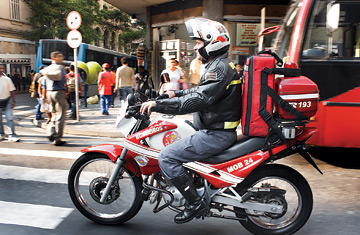
A motorcycle medic that works out of the downtown Praa da S station cruises around the downtown or Centro of Sao Paolo, Brazil on Wednesday, September 18, 2007.
It is rush hour in São Paulo, and I am riding pillion through the frenetic streets of downtown. Up ahead are two motorbike medics on their way to an emergency call. From the way they handle their bikes I can tell they are used to weaving through the nose-to-tail traffic. I, on the other hand, feel as if I am in a deadly video game. This is São Paulo, the biggest metropolis in South America and one of the most chaotic cities on earth. Everywhere we turn, obstacles rush at us. As we approach the city's cathedral, striking postal workers spill onto the road and force us to swerve into the middle lane. Just around the corner, a boxy Fiat cuts us off and sends us veering into the gutter. My teeth are clenched and my knuckles are white. I pray I won't become the medics' next stop.
The last thing they need is more work. There were 73,202 accidents on the roads of Greater São Paulo last year and 1,487 fatalities. The situation is exacerbated when emergency vehicles get tangled in backups that can stretch for 100 miles (160 km) at rush hour. The congestion is so bad that the city forbids 1 in 5 cars, depending on license-plate number, from leaving home at peak travel times each day. But the streets are still a mess. "Ambulances often simply can't get through," says Carlos Eid, a doctor with the Brazilian Association of Traffic Medicine.
Enter motorbike medics, who flit between slow-moving cars and speed around stopped traffic. The two-wheeled first responders are dispatched from the 15 firehouses closest to São Paulo's main drags. Other cities employ moto-medics--London, Kuala Lumpur and Miami, among them--but in Brazil the program holds special significance since there is no centralized 911 and firefighters have become the go-to guys when accidents occur, perhaps because the country's health service is in disarray and the police are among the nation's least esteemed public servants. "People trust us," says fire department spokesman Lieut. Marcos Palumbo. "We always respond to emergencies." Quickly too. The day I follow them, the medics arrive at the scene of an accident in three minutes, three times faster than the ambulance.
To train, the firefighters take 240 hours of first-aid education as well as a two-week course on motorcycle skills and maintenance. They must be as skilled at using a defibrillator as riding their 400-cc Honda Falcons up and down flights of steps, but in conversation they stress that their job is meant to evaluate and stabilize emergency situations before full paramedics arrive, not to replace them altogether. "The advantage of getting there first is that we can do triage," says Mauricio Rodrigues, a moto-medic for the past six years. "We make a quick and rational analysis of what needs to be done."
That is precisely what he accomplishes the afternoon we arrive at a school choir competition and find seven girls laid out on the sidewalk. A school van had rolled backward into an underground garage, hitting some girls standing there and injuring others inside the vehicle. Rodrigues and his partner go to work, sidelining the five girls with minor injuries and moving quickly to the pair with possible fractures. The medics pull moldable splints from their backpacks and strap them to the young legs. Then they phone in to request an additional ambulance to back up the one that has already been dispatched.
What is unusual about this case is that there were no motorcyclists involved. Motorbikes account for 9% of the city's vehicles but they cause more accidents than all the rest combined, according to city traffic officials. That means moto-medics also come with a dose of irony. "I saw someone on the television last night saying she'd kill all the motorcyclists in the city if she could," says the fire department's Palumbo. "But if she crashes her car, her opinion will change, because we'll be there to help her."
